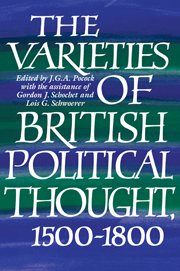Editorial introduction
Published online by Cambridge University Press: 04 August 2010
Summary
The essays presented in this volume offer compelling evidence of the remarkable varieties of British political thought in the early modern era, 1500-1800. Written by the Directors of seminars that were organized to cover that era in approximately fifty-year segments at a time and were held from 1984 through 1987 under the aegis of the Center for the History of British Political Thought at The Folger Shakespeare Library in Washington, DC, these chapters are the result – to that date – of the Center's ongoing project: to explore in depth the changing patterns of British political discourse over approximately three centuries, from the English Reformation and the advent of print culture to the impact of the American and French Revolutions upon Great Britain. Sponsored by the Center (whose affairs are conducted by a Steering Committee of the three editors of this volume and Dr Lena Cowen Orlin, Executive Director of The Folger Institute), this volume hopes to contribute to the creation of a comprehensive history of British political discourse in this era, and a reconceptualization of that discourse.
These essays are informed by certain assumptions and principles and shaped by a special circumstance. First, the history of political thought that the chapters present takes the form of a history of political ‘discourse’; that is, they focus on the principal vocabularies or ‘languages’ which were available and exploitable for the conduct, discussion, vindication and criticism of political action and the principles on which it was seen to be founded.
- Type
- Chapter
- Information
- Publisher: Cambridge University PressPrint publication year: 1994

